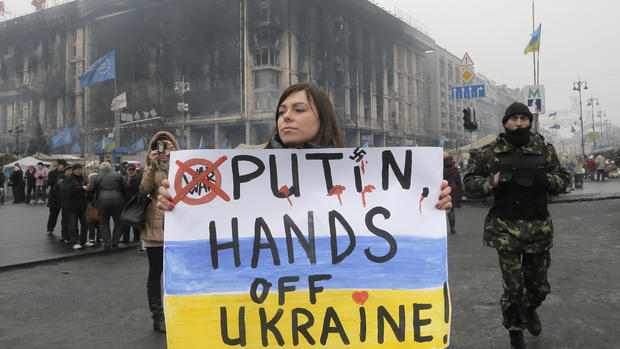Ukraine crisis: Crimean parliament declares desire to secede from Ukraine
KIEV, Ukraine - The Crimean parliament on Tuesday said it would declare itself independent if its residents approve a referendum to split off from Ukraine - an ambiguous legal maneuver that could offer a way of de-escalating the standoff between Russia and the West.
The referendum called for Sunday proposes seceding from Ukraine and becoming part of Russia. But the Crimean parliament's declaration could put the bid to join Russia on hold, depending on the outcome of Russian President Vladimir Putin's bargaining with the West.
The dispute between Moscow and the West over Crimea is one of the most severe geopolitical crises in Europe since the end of the Cold War. Russian forces have secured control over the peninsula, but President Obama and other Western leaders have warned that the March 16 referendum in Crimea would violate international law and have advised Russia to not try to annex the peninsula. Putin countered that in phone calls with German Chancellor Angela Merkel and British Minister David Cameron.
"The steps taken by the legitimate leadership of Crimea are based on the norms of international law and aim to ensure the legal interests of the population of the peninsula," Putin said, according to the Kremlin.
Crimea, where Russia maintains its Black Sea Fleet base, became the epicenter of tensions in Ukraine after President Viktor Yanukovych fled last month in the wake of months of protests and otubreaks of bloodshed.
The Crimean parliament's move is "a message to the West that there is no talk about Russia incorporating Crimea," said Kiev-based political analyst Vadim Karasyov. "It's a tranquilizer for everybody - for the West and for many in Ukraine who are panicking."
Karasyov speculated that Crimea could exist as a "quasi-legitimate" state, while Russia and the West negotiate.
After a brief war between Russia and Georgia in 2008, some leaders in Georgia's breakaway provinces of Abkhazia and South Ossetia lobbied to join Russia, but their request was never granted.
Putin's "task now is to get a stake in the shareholding company called Ukraine. He believes that the West now has the majority stake and he doesn't even have a blocking package," Karasyov told the AP. "So Crimea is an attempt to get a blocking package."
Sergei Zheleznyak, a deputy speaker of the lower house of the Russian parliament, rejected proposals to draft new legislation to facilitate Crimea's accession into Russia. Zheleznyak wouldn't elaborate, and it wasn't clear whether his statement signaled the Kremlin's willingness to relax tensions or was part of legal maneuvering over the annexation plans.
If Putin can't negotiate a solution to the crisis with the West -- and the attempts to negotiate thus far have been rocky at best -- the Crimean parliament's move could also facilitate accession into Russia. Under current law, Russia needs to reach agreement with a foreign state to incorporate part of it. Crimea's declaration of independence could solve that, though the West made it clear it would not recognize the annexation.
In a sign that some members of Putin's entourage would prefer a negotiated solution to an all-out confrontation with the West, Konstantin Remchukov, the well-connected publisher and editor of the daily Nezavisimaya Gazeta, spoke strongly against annexing Crimea. Remchukov, who avoids criticizing Putin, said on Ekho Moskvy radio that the move will trigger painful Western sanctions and cripple the Russian economy.
Remchukov said he believes Russia could negotiate a deal that would have the West guarantee the rights of Russian speakers and ensure its Black Sea Fleet's continuing presence in Crimea. Russia could promise concessions on the Syrian and Iranian crises in response to the Western willingness to respect Russian interests in Ukraine, Remchukov suggested.
Meanwhile, Ukraine's acting president on Tuesday called for the formation of a national guard and for the mobilization of reserves and volunteers into the country's armed forces.
At the same time, Ukraine's acting Defense Minister Ihor Tenyukh admitted that Ukrainian armed forces and equipment were significantly outnumbered by the Russian army and exhorted wealthy Ukrainians to donate money to equip the nation's army. He said Russia has some 220,000 troops, 800 tanks, 400 helicopters, 150 planes and 60 ships used in Crimea and in military exercises near Ukrainian borders, "several times" more than what the Ukrainian army has.
"What secures victory at war is organization, resources, strategy, tactics and fighting spirit. Today, the armed forces only have the latter two elements - tactics and fighting spirit," Tenyukh told parliament.
Ukrainian Prime Minister Arseniy Yatsenyuk, who will fly to Washington to meet President Barack Obama on Wednesday, called on Western nations to defend Ukraine against a nation "that is armed to the teeth and that has nuclear weapons."
Yatsenyuk asked Russia, the U.S. and European Union member Britain to abide by a treaty signed in 1994, in which they pledged to guarantee Ukraine's security in exchange for surrendering its share of Soviet nuclear arsenals to Russia.
"We are not asking for anything from anyone," Yatsenyuk told parliament. "We are asking for just one thing: military aggression has been used against our country. Those who guaranteed that this aggression will not take place must from the one side pull out troops and from the other side must defend our independent, sovereign state."
Later in the day, parliament passed a resolution calling on the U.S. and Britain to "use all possible diplomatic, political, economic and military measures for an immediate stopping of aggression."
Yanukovych, speaking in the southern Russian city of Rostov-on-Don, repeated Russia's claim that the new Ukrainian authorities are kowtowing to radical nationalists, and posed a threat to Russian-speaking eastern regions.
Yanukovych, who fled last month after months of protests, said he would soon return to Ukraine.
